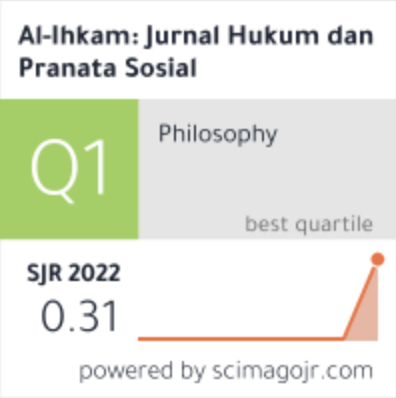The Meaning of Happiness and Religiosity for Pre-Prosperous Family: Study in Manado, Bandar Lampung, and Yogyakarta
 Abstract views: 362
,
Abstract views: 362
,
 PDF downloads: 314
PDF downloads: 314
Abstract
The results of this research (2017) want to explain the correlation between happiness and religiosity for poor families. The locus of this research is in the city of Manado, North Sulawesi Province, Bandar Lampung City, Lampung Province, and Yogyakarta City in Yogyakarta Special Region Province. This research is important because there is an assumption in the community that even poor people who are religious are certainly not happy. This assumption is further answered in this study, where there is a positive and significant relationship between happiness and religiosity in poor families in Yogyakarta, but not for Manado and Bandar Lampung. The highest level of happiness is in the city of Yogyakarta and the highest level of religiosity is in the city of Manado. This difference occurs because the concept of happiness for religious poor families in Manado, Yogyakarta and Bandar Lampung has different point of view and has the unique itself.
Downloads
References
Bandar Lampung, BPS. “Garis Kemiskinan 2010-2014.” Badan Pusat Statistik Kota Bandar Lampung. Garis Kemiskinan Kota Bandar Lampung 2010-2013 (blog), 6 Desember 2019. https://bandarlampungkota.bps.go.id/statictable/2015/12/08/16/garis-kemiskinan-kota-bandar-lampung-2010-2013.html.
Compton, W.C. Introduction to Positive Psikologi. USA: Malloy Incorporated, 2005.
Herusatoto, B. Simbolisme Jawa. Yogyakarta: Ombak Yogyakarta, 2008.
Hidayat, Syarif Imam. “Kemiskinan dalam Perspektif Masyarakat Desa Tertinggal yang Religius.” Disertasi, Universitas Brawijaya, 2011.
Irhan, Mohammad. “Etos Kerja dalam Perspektif Islam.” Jurnal Substansia 14, no. 1 (April 2012).
Nasikun. Isu dan Kebijakan Penanggulangan Kemiskinan. Diktat Mata Kuliah. Yogyakarta: Program Magister Administrasi Publik Universitas Gadjah Mada, 2001.
Seligman, Martin E.P. Authentic Happiness: Using the New Positive Psychology to Realize Your Potential for Lasting Fulfillment. New York: Atria Paperback, 2013.
Shihab, Muhammad Quraish. Wawasan Alqur’an: Tafsir Maudhu’i atas Berbagai Persoalan Umat. 14 ed. Bandung: Mizan, 1996.
Sugiyono. Metode Penelitian Kombinasi (Mixed Methods). Bandung: CV. Alfabeta, 2011.
Sulut, BPS. “Garis Kemiskinan di Kota Manado, 2004-2015.” Badan Pusat Statistik Kota Manado (blog), 18 Agustus 2017. https://manadokota.bps.go.id/statictable/2017/08/18/202/garis-kemiskinan-di-kota-manado-2004-2016.
Yogyakarta, BPS. “Tabel Kemiskinan Kota Yogyakarta,” 6 Desember 2019. https://jogjakota.bps.go.id/dynamictable/2019/01/08/32/tabel-kemiskinan-kota-yogyakarta.html.
In order to be accepted and published by Al-Ihkam: Jurnal Hukum dan Pranata Sosial, author(s) submitting the article manuscript should complete all the review stages. By submitting the manuscript, the author(s) agreed to the following terms:
- The copyright of received articles shall be assigned to Al-Ihkam: Jurnal Hukum dan Pranata Sosial as the publisher of the journal. The intended copyright includes the right to publish articles in various forms (including reprints). Al-Ihkam: Jurnal Hukum dan Pranata Sosial maintain the publishing rights to the published articles.
- Authors are permitted to disseminate published articles by sharing the link/DOI of the article at Al-Ihkam: Jurnal Hukum dan Pranata Sosial. Authors are allowed to use their articles for any legal purposes deemed necessary without written permission from Al-Ihkam: Jurnal Hukum dan Pranata Sosial with an acknowledgment of initial publication to this journal.
- Users/public use of this website will be licensed to CC-BY-SA.



.png)
_1.png)










